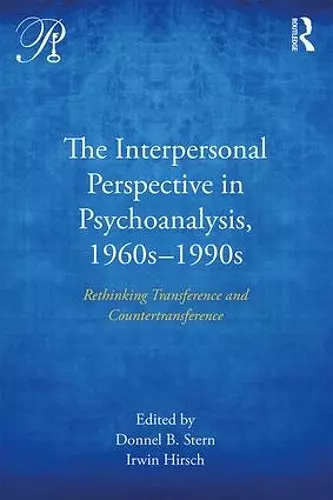The Interpersonal Perspective in Psychoanalysis, 1960s-1990s
Rethinking transference and countertransference
Irwin Hirsch editor Donnel B Stern editor
Format:Paperback
Publisher:Taylor & Francis Ltd
Published:28th Feb '17
Currently unavailable, and unfortunately no date known when it will be back
This paperback is available in another edition too:
- Hardback£170.00(9780415714280)

North American psychoanalysis has long been deeply influenced and substantially changed by clinical and theoretical perspectives first introduced by interpersonal psychoanalysis. Yet even today, despite its origin in the 1930s, many otherwise well-read psychoanalysts and psychotherapists are not well informed about the field. The Interpersonal Perspective in Psychoanalysis, 1960s–1990s provides a superb starting point for those who are not as familiar with interpersonal psychoanalysis as they might be. For those who already know the literature, the book will be useful in placing a selection of classic interpersonal articles and their writers in key historical context.
During the time span covered in this book, interpersonal psychoanalysis was most concerned with revising the understanding of the analytic relationship—transference and countertransference-and how to work with it. Most of the works collected here center on this theme. The interpersonal perspective introduced the view that the analyst is always and unavoidably a particular, "real" person, and that transference and countertransference need to be reconceptualized to take the analyst’s individual humanity into account. The relationship needs to be grasped as one taking place between two very particular people. Many of the papers are by writers well known in the broader psychoanalytic world, such as Bromberg, Greenberg, Levenson, and Mitchell. But also included are those by writers who, while not as widely recognized beyond the interpersonal literature, have been highly influential among interpersonalists, including Barnett, Schecter, Singer, and Wolstein.
Donnel B. Stern and Irwin Hirsch, prominent interpersonalists themselves, present each piece with a prologue that contextualizes the author and their work in the interpersonal literature. An introductory essay also reviews the history of interpersonal psychoanalysis, explaining why interpersonal thinking remains a coherent clinical and theoretical perspective in contemporary psychoanalysis. The Interpersonal Perspective in Psychoanalysis, 1960s–1990s will appeal greatly to psychoanalysts and psychoanalytic psychotherapists wanting to know more about interpersonal theory and practice than can be learned from current sources.
"Interpersonal Psychoanalysis is by far the most distinctive and specifically American contribution to psychoanalysis. Sullivan has persuasively been described as the "Psychiatrist of America," and interpersonal psychoanalysis has clearly absorbed and exemplifies such core American values as pluralism, pragmatism, concrete experience, and interactionism. Donnel Stern and Irwin Hirsch's The Interpersonal Perspective in Psychoanalysis, 1960s-1990s: Rethinking transference and countertransference provides the most solid introduction to this unique American school and it includes a scholarly and cogent historical introduction to the overall tradition as well as to each of the vintage papers and major contributors represented. This will remain a classic collection of psychoanalytic papers for many years to come."-Lewis Aron, Ph.D., Director, New York University Postdoctoral Program in Psychotherapy and Psychoanalysis.
"This is an important book. It is also an exciting adventure. A reader can "feel-into" the psychoanalytic meaning of interpersonal as the context of co-existence—a context in which the creative freedom intrinsic to the analyst/patient dyad shapes a process of personality growth that is its "outcome." The essence of interpersonal is not communicated through theory but through its commitment to empowering psychoanalysis as psychotherapy. One could argue that if psychoanalysis is to assure its future relevance it must uniformly earn the privilege by making the same foundational commitment. This volume should be an essential treasure in any library."-Philip M. Bromberg, Ph.D., Training and Supervising Analyst, William Alanson White Psychoanalytic Institute; Adjunct Clinical Professor of Psychology, NYU Postdoctoral Program in Psychotherapy and Psychoanalysis.
"This book locates and pays homage to the origins and early development of the interpersonal perspective but really does so much more than simply historiographical duty. In examining key voices over several generations of interpersonalists, we actually see and feel the radical vision. For some the birth narratives offer up Ferenczi (Wolstein, Searles), for others, it is Sullivan (Hirsch Stern), for others still post modernism and post structuralism (Levenson), for others it is in the power of examining psychotic process (Searles, Barnett) and for others it is the unsettling of technique (Wolstein, Greenberg). We can see a variety of two person readings of early object relations (Bromberg, Stern). This book is a brilliant re-reading of the interpersonal worlds in which the editors Hirsch and Stern are prominent members of a current generation. In so many unique idioms and voices and stances, we are urged to loosen our grip on certainty, to face the harrowing experience of patient’s suffering without retreating from our own. This collection gives us a half-century of wisdom, as useful for the mature as for the novice analyst."-Adrienne Harris, New York University, Editor of the Relational Perspectives Book Series.
ISBN: 9781138281936
Dimensions: unknown
Weight: 476g
310 pages